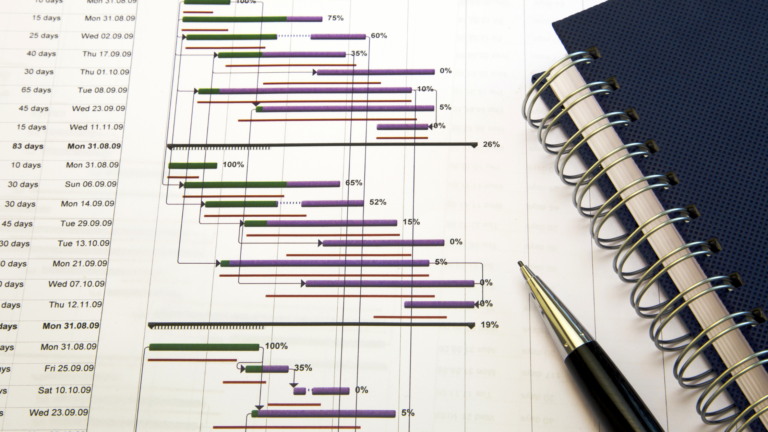If you’re starting as a project manager — or hoping to become one, you’re probably wondering what hard skills you should possess. The truth, it takes work to be a successful project manager. The role involves a wide range of responsibilities and hard skills.
Hard skills are technical and measurable and developed through education and professional experience.
Luckily, you can learn and develop your skills by knowing what it takes to become a better project manager.
Here is what the project manager’s role entails and what important skills you need to manage projects successfully.
What a Project Manager Does
For most organizations, larger tasks are broken down into different projects. These projects will have a specific goal, deadline and various individuals assigned.
However, the project manager is responsible for coordinating and overseeing all the aspects of the project — ensuring its completion. Often, this type of work involves:
- Communicating with stakeholders.
- Managing team members.
- Setting and adjusting deadlines.
- Prioritizing tasks.
- Motivating staff.
- Planning and monitoring workflow.
- Facilitating communication and more.
As you can see, the role of the project manager requires various tools, techniques and competencies. In knowing that, a successful project manager must have different hard skills to do their job well.
Here are some of the hard skills a project manager must possess.
7 Must-Have Hard Skills for Project Managers
1. Organization

To keep projects running smoothly, you should be highly organized. Nothing should be able to slip through the cracks — meaning files should have clear labeling, and everything related to the project should be easy to find.
If your team finds they scramble to look for something, lose important files or struggle to meet deadlines — this is an opportunity for you to improve your organization skills.
One way of maintaining organization is by keeping your priorities set. Have a list of top to-do’s for your team members to tackle. That way, you can keep track of those results.
You can also establish milestones for each team member to make the goal of finishing the project seem less intimidating. By creating milestones, you can work on everything at a good pace and without pressure.
2. Negotiating
An essential part of the project manager’s role is to handle the expectations between the stakeholders and client — and what the team can deliver realistically.
A project manager aims to get everybody on the same terms — from negotiating prices and deadlines to deliverable details.
If you can obtain your desired outcome from each negotiation, you’re doing a good job. However, negotiating without alienating the other party or creating tension will be the ultimate goal.
3. Technical Skills Relevant to the Project
Whatever project your team works on, the project manager must have a solid background on the work they’re accomplishing. For example, suppose your team is responsible for developing an app. It’s extremely helpful to have a basic understanding and background in development.
When you understand the technical terms your team is talking about — and know how to do the tasks yourself, you can rest assured that you’re succeeding.
4. Project Planning
A must-have project management skill is project planning. A project plan is the foundation of the project management process. In a traditional setting, your goal is to get from point A to point B with certain outcomes and objectives achieved.
However, you need to know how to get there. The planning stage is all about laying out the foundation for everything. It includes the costs, resources and scheduling.
Yet, a good project manager will build out an effective, logical and realistic plan to completion.
One effective way to plan a project effectively is to first lay out everything on paper. Doing so will provide a clear picture of the goals and how the individual roles fit within the entire mission.

5. Project Scheduling
Project scheduling is a vital part of the project planning process. It organizes tasks, teamwork and the timeline of the project. When you can keep workers on task and schedule, it creates a huge difference in accomplishing goals and staying within budget.
By setting achievable deadlines, the project manager gets to keep the team moving forward. Yet, your team needs to be on the same page about the timeline to keep everyone in line. They should also have regular reminders and updates.
If an issue occurs, you should know how to get things back on track to get the work done on time.
On the other hand, the project manager should know to evaluate goals and break down what needs to be completed. So before you assign jobs — or accept changed suggestions, you should see how these shifts will fit into the project’s scope. Plus, it’s helpful to be aware of any completely out-of-scope tasks.
6. Delegation
Every project has milestones, so you have the matter of when tasks must be completed and by whom. This aspect falls under the skill of delegating each team member.
A strong delegator will ensure each assigned worker will have something to perform and the right people working on a task. They also need to make sure that nobody feels overworked.
Similarly, they should avoid micromanaging but ensure everyone feels confident enough to do their best work. The best way to manage a team is by providing them with freedom and enough information to complete their tasks.
In addition, they should make sure to plan the project enough ahead of time. That way, there are no last-minute adjustments to make.
7. Budget and Risk Management
Every project has a budget. So it’s the project manager’s job to ensure the project doesn’t go over budget. So it’s critical to have a basic understanding of spreadsheets, math and financing.
A good project manager knows how to keep projects within or under budget with every project consistently. This means tracking costs throughout the project’s lifecycle and planning, so it doesn’t exceed the budget.
In addition, projects of any size are inherently risky. Before execution, you have to develop a risk management plan — identifying, assessing and controlling risks. The more you manage your risks, the better the chances of your project succeeding.
Do You Have the Tenacity to Be a Skilled Project Manager?
Knowing what skills you require to be a successful project manager, you can better equip yourself to take on the responsibilities. The work of the project manager takes proper grip and commitment. Yet, you can learn these skills and put them to good use to make your projects happen adequately.
